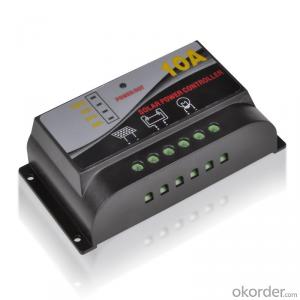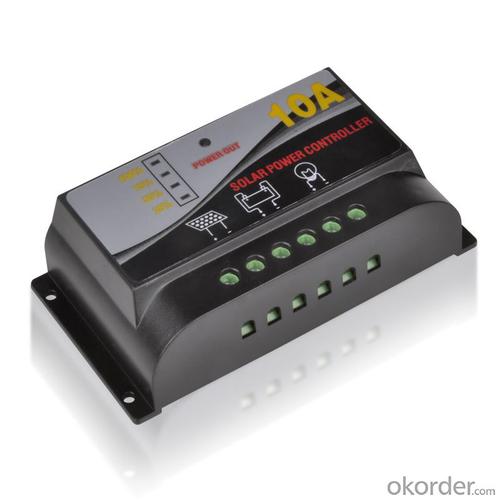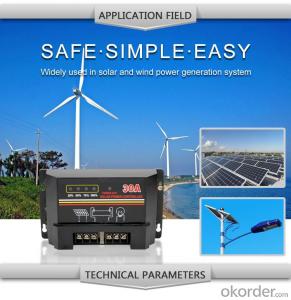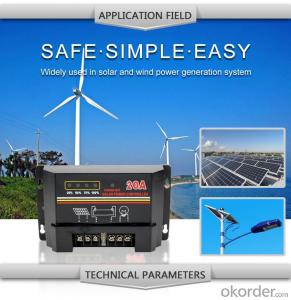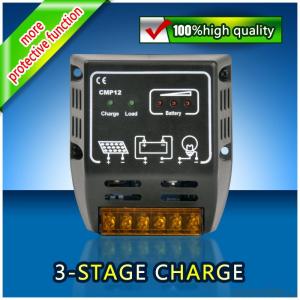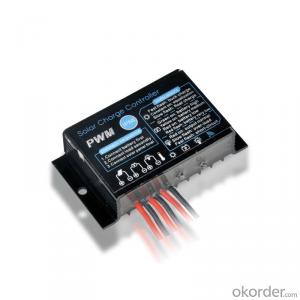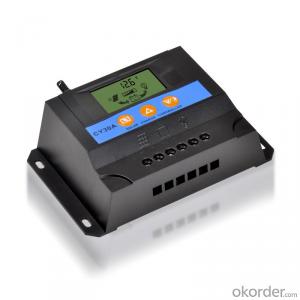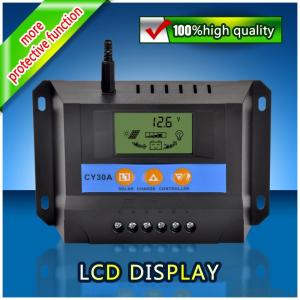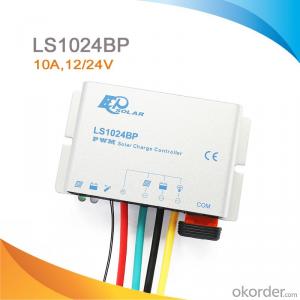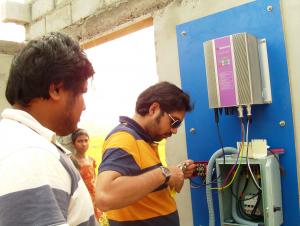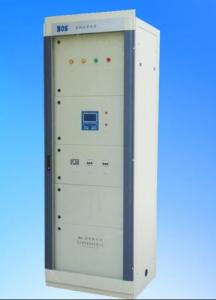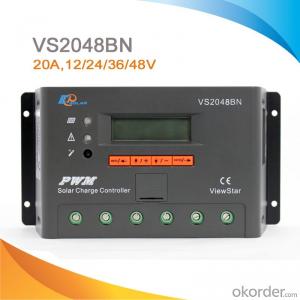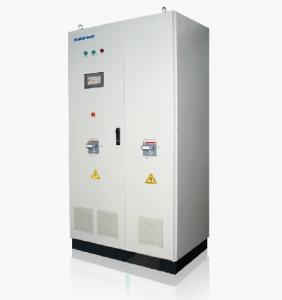Solar Panel Controllers 12v - DM110A Solar LCD Controller with Best Price Hot Selling Model
- Loading Port:
- China main port
- Payment Terms:
- TT or LC
- Min Order Qty:
- 1 unit
- Supply Capability:
- 10000 unit/month
OKorder Service Pledge
OKorder Financial Service
You Might Also Like
Product Introduction
Solar controller is control device which can control solar panel and transform solar energy into electricity then store to the battery bank. Solar controller is the most important part in offgrid system, whose performance has much effect on life expectancy and operation of the whole system, especially the battery expectancy.
Application Areas
Standalone Photovoltaic power station
Standalone Domestic household photovoltaic power system
Mobil communication base stations, expressway and other non-residential regions.
Coastal islands, remote mountainous, border posts for regions shortage of or without electricity.
Government demonstration projects, landscape lighting project etc.
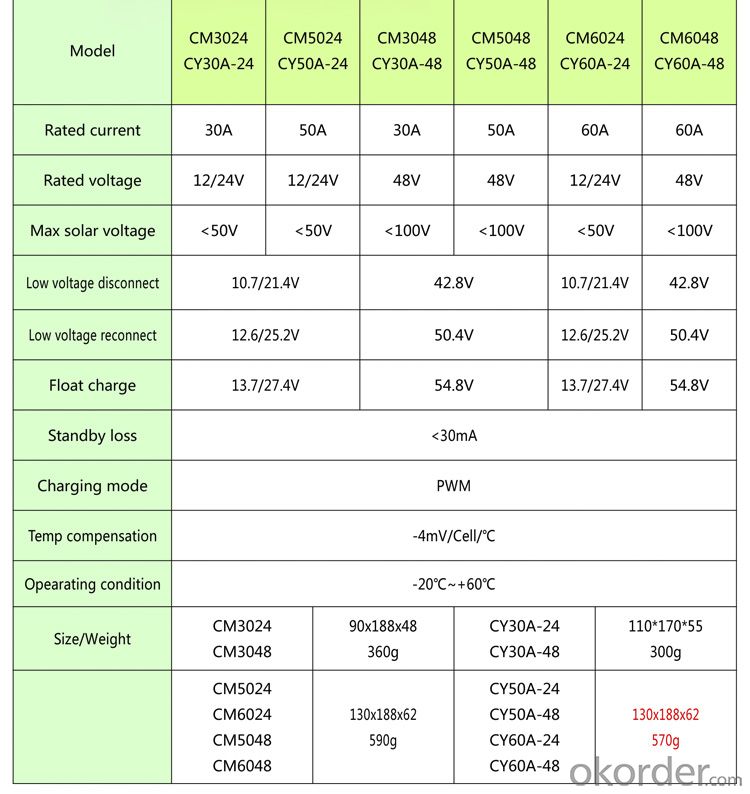
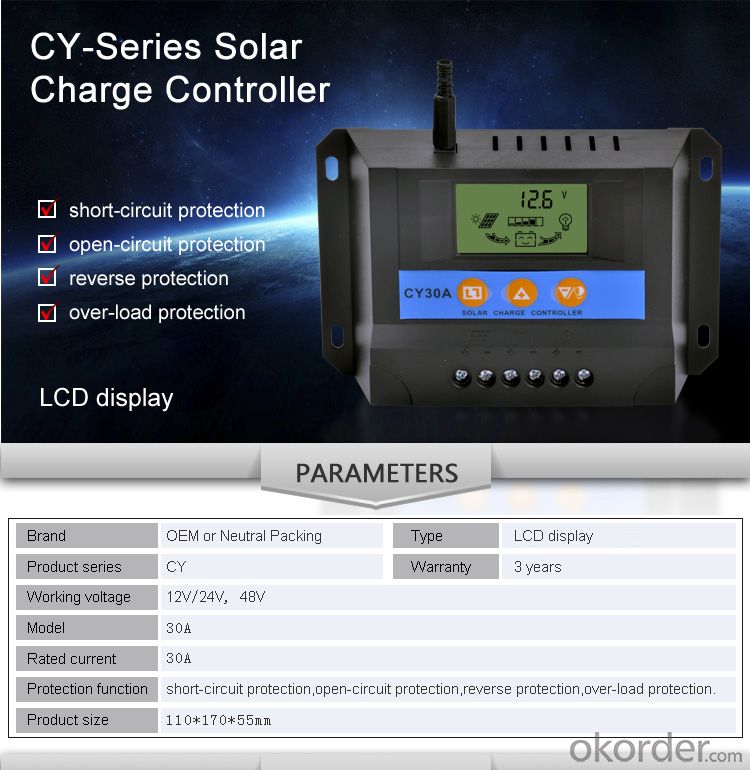
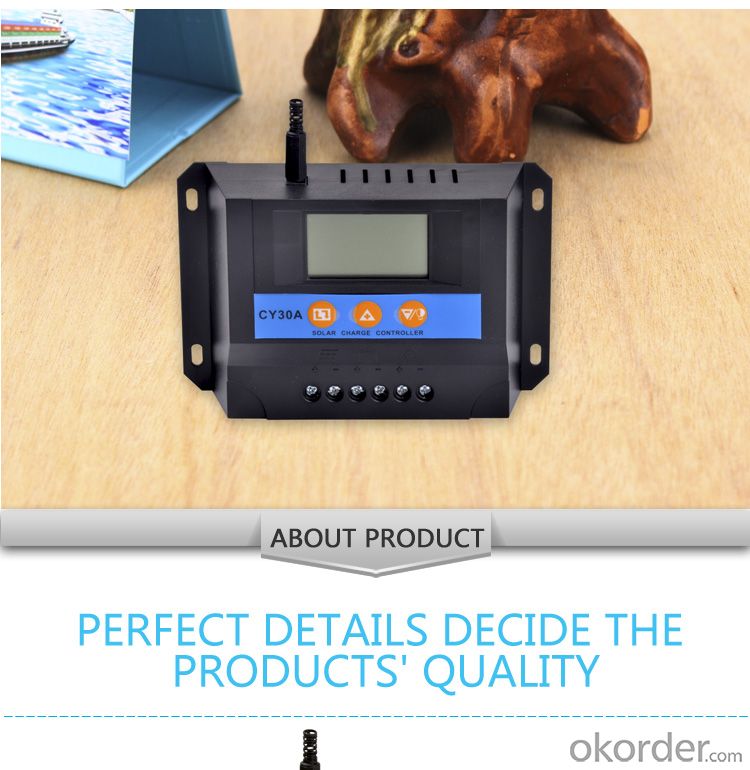
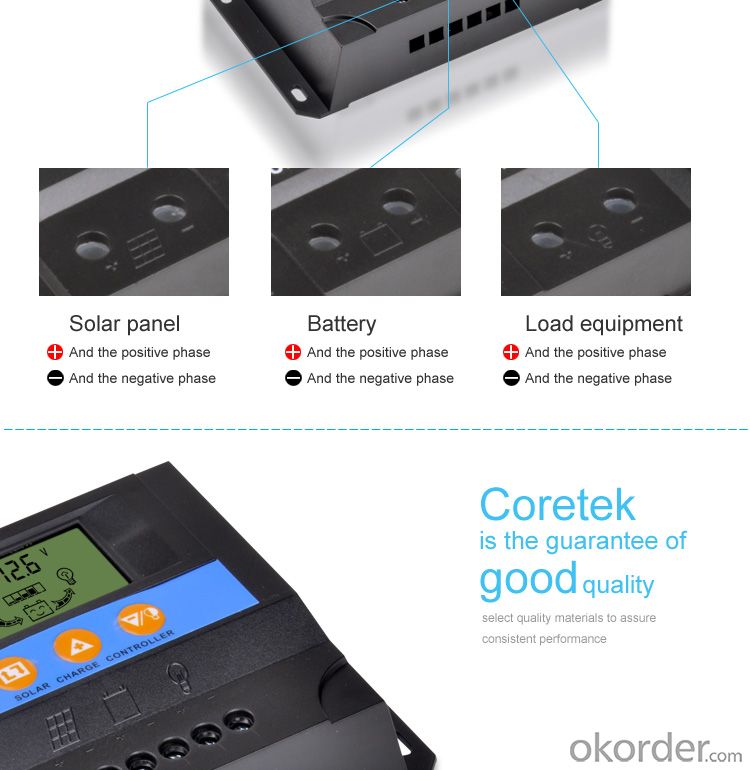
- Q: Can a solar controller prevent overcharging of batteries?
- Preventing overcharging of batteries is one of the key functions of a solar controller. Also referred to as a charge controller or regulator, it plays a vital role in a solar power system by regulating the voltage and current that flows from the solar panels to the batteries. Its primary purpose is to protect the batteries from overcharging, as this can result in reduced battery life and potential damage. The solar controller constantly monitors the voltage and state of charge of the batteries, making adjustments to the charging current as necessary. When the batteries reach full charge, the solar controller prevents any further charging by redirecting the excess energy generated by the solar panels. Typically, this is achieved by either reducing the charging current or disconnecting the panels from the batteries. In addition to its basic functions, some advanced solar controllers offer additional features such as temperature compensation and equalization charging. Temperature compensation ensures optimal battery performance and longevity by adjusting the charging voltage based on the battery temperature, preventing overcharging or undercharging in different environmental conditions. On the other hand, equalization charging is a controlled overcharging process that is performed periodically to balance the battery cells and eliminate sulfation, ultimately enhancing battery performance. In summary, a solar controller is an indispensable component in a solar power system that safeguards the batteries against overcharging. Its presence ensures the longevity and optimal performance of the batteries, making it an essential aspect of any solar setup.
- Q: Can a solar controller be used with solar-powered remote control systems?
- Yes, a solar controller can be used with solar-powered remote control systems. A solar controller helps regulate the charging and discharging of the batteries in a solar-powered system, ensuring optimal performance and preventing damage. This makes it an essential component in remote control systems that are powered by solar energy.
- Q: How does a solar controller prevent overvoltage in the system?
- A solar controller prevents overvoltage in the system by continuously monitoring the voltage levels of the solar panel and battery. When the voltage exceeds a certain threshold, the controller automatically regulates the charging process to prevent excessive charging and potential damage to the batteries. It accomplishes this by reducing the charge current or diverting the excess energy to a secondary load, thereby maintaining a safe and optimal voltage level in the system.
- Q: What is the purpose of the battery temperature compensation feature on a solar controller?
- The battery temperature compensation feature on a solar controller serves the purpose of ensuring optimal charging and discharging of the battery under different temperature conditions. Batteries are sensitive to temperature, and extreme hot or cold temperatures can affect their performance. When exposed to high temperatures, batteries undergo accelerated chemical reactions, resulting in increased self-discharge, reduced capacity, and a shorter overall lifespan. Conversely, extremely cold temperatures can lead to decreased battery efficiency and capacity. To address these temperature-related issues, solar controllers equipped with the battery temperature compensation feature continuously monitor the battery's temperature and make necessary adjustments to the charging and discharging parameters. By accurately measuring the battery's temperature, the controller can determine the appropriate voltage and current levels required for safe charging. During hot temperatures, the compensation feature decreases the charging voltage to prevent overcharging and excessive heat generation, thus safeguarding the battery from potential damage. Conversely, in cold temperatures, the compensation feature increases the charging voltage to counteract the decrease in battery capacity caused by lower temperatures. By adapting the charging and discharging parameters based on the battery's temperature, the battery temperature compensation feature optimizes the battery's performance, prolongs its lifespan, and ensures its safe operation. This feature is especially crucial in solar systems situated in off-grid or remote locations, where batteries are exposed to varying temperature conditions.
- Q: What is the role of temperature compensation in a solar controller?
- The role of temperature compensation in a solar controller is to adjust the charging parameters, such as voltage and current, based on the temperature of the battery. This helps to optimize the charging process and prevent overcharging or undercharging, which can reduce the lifespan of the battery. Temperature compensation ensures that the battery receives the appropriate charging voltage and current, regardless of the temperature fluctuations, leading to improved efficiency and longevity of the solar system.
- Q: Can a solar controller be used with solar-powered remote weather stations?
- Yes, a solar controller can be used with solar-powered remote weather stations. A solar controller is essential in regulating and optimizing the charging of batteries connected to solar panels. It helps manage the flow of energy from the solar panels to the batteries, ensuring efficient charging and preventing overcharging or damage to the batteries. This is particularly important for remote weather stations that rely on solar power, as it helps maintain a consistent and reliable power supply for continuous operation.
- Q: How does a solar controller prevent damage to the solar panels during hail or storm events?
- A solar controller, also known as a charge controller, plays a crucial role in preventing damage to solar panels during hail or storm events. Its primary function is to regulate the flow of electricity from the solar panels to the battery bank or grid, ensuring optimal charging and preventing overcharging or overvoltage. During hail or storm events, the solar controller acts as a protective barrier between the solar panels and the external environment. It effectively mitigates the risks associated with hail or storm damage by employing various mechanisms: 1. Voltage Regulation: Solar controllers monitor and regulate the voltage output from the solar panels. In the event of a sudden increase in voltage due to hail or storm-induced power fluctuations, the controller immediately detects the excess voltage and regulates it to a safe level. This prevents the solar panels from being overloaded, which could lead to irreversible damage. 2. Overcurrent Protection: In the event of a storm, heavy winds or debris may cause electrical surges or short circuits in the solar panel system. A solar controller includes overcurrent protection mechanisms that detect any abnormal current flow and immediately disconnects the panels from the battery or grid, preventing damage to the panels or other components. 3. Surge Protection: Hail or storm events often come with power surges or voltage spikes. Solar controllers typically include built-in surge protection features to safeguard the entire system from these voltage fluctuations. These protections prevent damage to the sensitive electronic components of the solar panels, ensuring their longevity and uninterrupted performance. 4. Temperature Monitoring and Protection: Extreme weather conditions during hail or storm events can lead to rapid temperature fluctuations. Solar controllers ensure that the panels are operating within a safe temperature range. They monitor the panel temperature and employ mechanisms such as reducing the charging rate or temporarily shutting down the system if the temperature exceeds the safe limit. By preventing overheating, the solar controller helps to prolong the lifespan of the solar panels. Overall, a solar controller acts as a vital safety mechanism that protects solar panels from potential damage during hail or storm events. It regulates voltage, prevents overcurrent, provides surge protection, and monitors temperature to ensure the panels are operating optimally and within safe parameters. By doing so, it helps to ensure the longevity and efficiency of the solar panel system.
- Q: Can a solar controller be used in a solar-powered Mars colonization mission?
- Yes, a solar controller can be used in a solar-powered Mars colonization mission. A solar controller is an essential component in regulating the flow of electricity from the solar panels to the batteries, ensuring efficient charging and preventing overcharging or damage to the system. Given the reliance on solar power in such a mission, a solar controller would be crucial for managing and optimizing the energy generated by the panels, thus facilitating the success of the colonization efforts on Mars.
- Q: What are the key features to consider when choosing a solar controller?
- When choosing a solar controller, it is important to consider several key features. One of the most crucial features is the controller's maximum input voltage and current rating, as it should be compatible with the solar panel system you are using. Additionally, the controller's maximum load capacity should be considered to ensure it can handle the power demands of your appliances or batteries. The controller should also have a suitable charging algorithm, such as Pulse Width Modulation (PWM) or Maximum Power Point Tracking (MPPT), to efficiently charge the batteries. Other important features to consider include temperature compensation, communication capabilities, display options, and protection measures like overcharge, overload, and short circuit protection. Ultimately, the key features will depend on your specific solar system requirements and intended usage.
- Q: Can a solar controller be used with a solar-powered sports facility?
- Yes, a solar controller can be used with a solar-powered sports facility. A solar controller is an essential component that regulates the charging and discharging of batteries in a solar power system, ensuring optimal performance and preventing damage. In a solar-powered sports facility, the solar controller would help manage the flow of energy from the solar panels to power the facility's electrical needs and store any excess energy in batteries for later use.
Send your message to us
Solar Panel Controllers 12v - DM110A Solar LCD Controller with Best Price Hot Selling Model
- Loading Port:
- China main port
- Payment Terms:
- TT or LC
- Min Order Qty:
- 1 unit
- Supply Capability:
- 10000 unit/month
OKorder Service Pledge
OKorder Financial Service
Similar products
Hot products
Hot Searches
Related keywords
